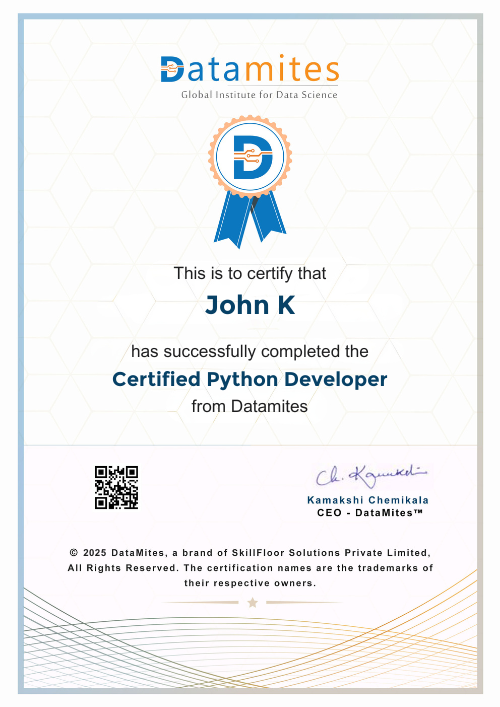Instructor Led Live Online
Self Learning + Live Mentoring
Customize Your Training

• Introduction of python
• Installation of Python and IDE
• Python Variables
• Python basic data types
• Number & Booleans, strings
• Arithmetic Operators
• Comparison Operators
• Assignment Operators
• IF Conditional statement
• IF-ELSE
• NESTED IF
• Python Loops basics
• WHILE Statement
• FOR statements
• BREAK and CONTINUE statements
• Basic data structure in python
• Basics of List
• List: Object, methods
• Tuple: Object, methods
• Sets: Object, methods
• Dictionary: Object, methods
• Functions basics
• Function Parameter passing
• Lambda functions
• Map, reduce, filter functions
• Decorators
• Generators
• Context Managers
• Metaclasses
• Inheritance and Polymorphism
• Encapsulation and Abstraction
• Class methods and static methods
• Special (magic/dunder) methods
• Property decorators - getters, setters, and deletes
• Working with files
• Reading and writing files
• Buffered read and write
• Other file methods
• Logging & Debugger
• Modules and import statements
• SQL Basics
• Creating DB Table
• INSERT, READ, UPDATE, DELETE
• Introduction to MongoDB
• CRUD operations in MongoDB
• namedtuple(), deque, ChainMap,
• Counter, OrderedDict, defaultdict,
• UserDict, UserList, UserString
• Exceptions handling with try-except
• Custom exception handling
• List of general use exception
• Best practice exception handling
• Generators, Iterators
• The Functions any and all
• With Statement
• Data Compression
• A Daytime Server
• Clients and Servers
• The Client and Server Programs
• Classes and Threads
• Multi-threading; thread life cycle
• Regular Expression Syntax
• Group, Split and wildcards
• Quantifiers
• Match, Search and Find all methods
• Character Sequence
• Introduction to OpenCV, Installation
• Basic Operations on Images
• Image Filtering
• Image Classification
• Introduction to GIT
• Basic Git commands
• Introduction to Flask and Installation
• Creating project
• Routing,templates, forms and database integration
• Deployment on render
• Django Introduction and Installation
• Creating a Project
• Django Architecture and File Structure
• Folder Structure, First Django project
• Database and Views, Static Files and Forms
• URL Mapping and Routing
• Defining Models and Relationships
• Database Migrations and Schema Changes
• Querying Data using Django ORM
• Model Forms and Form Validation
• HTML Forms in Django
• Model Forms and Form Validation
• Formsets and Inline Formsets
• File Uploads and Validation
• Deploying Django Applications
• Hosting Options (e.g., Heroku, AWS)
• Project Showcasing and Review
If you're unfamiliar with Python, it's a programming language that places an emphasis on simplicity and readability. With its strong community support and robust libraries, Python is a go-to choice for a variety of applications, including data analysis and web development.
Invented by Guido van Rossum in 1991 and developed by the Python Software Foundation, Python's syntax was designed for code readability and the ability to express concepts in fewer lines of code.
Python is a versatile and user-friendly language that offers various benefits, including its large standard library, simplicity, readability, and support for various platforms. It also has an extensive range of libraries for specialized areas such as scientific computing, data analysis, and machine learning.
Python is generally considered to be an easy-to-learn language, thanks to its simple and readable syntax, as well as extensive documentation. It also has a vast community and many resources available for beginners.
Python proficiency is critical for various job positions, including software developers, data analysts, data scientists, machine learning engineers, research analysts, and cybersecurity professionals.
No, prior knowledge is not required to learn Python. Python courses in Riyadh cater to beginners and teach the basics of Python programming, including variables, data types, and control structures, before progressing to more advanced topics such as functions, modules, and object-oriented programming.
The Python training fee in Riyadh varies depending on the level of training you opt for. Typically, the fee for classroom/online training ranges from 1000 SAR to 3000 SAR.
To learn Python programming, you need technical abilities such as basic programming knowledge, mathematical and analytical thinking, and logical reasoning. Along with these, essential soft skills like problem-solving abilities, attention to detail, time management, communication skills, and creativity are also required.
According to salaryexpert.com, the average python developer salary in Riyadh is SAR 248,301 per annum.
Getting Python certification in Riyadh can help your career in numerous ways. It can showcase your proficiency in the language, making you a sought-after candidate for a variety of industries. This can lead to better job prospects, increased salaries, and improved job stability. Furthermore, Python certification can boost your credibility and professional reputation, possibly opening up new career paths and opportunities for growth.
The duration of the Python training course in Riyadh varies depending on the specialization you select. Usually, the course takes between 2 to 4 months. The training is available on both weekdays and weekends, allowing you to choose the batch that best suits your schedule. The Python Developer Course in Riyadh, in particular, has a duration of 4 months.
If you are interested in learning Python programming in Riyadh, DataMites is a great option. With a range of course materials, expert instructors, and flexible scheduling options, students can acquire the necessary knowledge and abilities for a successful career in Python programming.
The fee for Python Training at DataMites in Riyadh varies based on the type of training you select. The Python Course Fees range from 994 SAR to 1820 SAR, while the Certified Python Developer Training Fees range from SAR 1228 to SAR 2840, depending on the mode of training you choose.
No, offline Python training is not available at DataMites in Riyadh. However, we offer an online Python training program.
The Flexi-Pass for Python training at DataMites is a 3-month program that offers students flexibility in attending sessions beyond the standard course duration.
Yes, you will receive an IABAC® certification after completing our Python training in Riyadh, which is globally recognized and demonstrates your competence in Python programming.
Yes, we provide options for extra assistance to Python training students who require more clarification on certain topics. Our trainers are available to offer guidance and support towards your learning objectives.
DataMites Python Training Online course in Riyadh can be paid for using various payment modes such as Cash, Net Banking, Check, Debit Card, Credit Card, PayPal, Visa, Mastercard, and American Express.
Yes, upon completion of the Python course, DataMites will provide you with a Course Completion Certificate.
The Python course training in Riyadh is conducted by a trainer who is selected based on their certification, experience, and expertise in the subject matter.
The DataMites Placement Assistance Team(PAT) facilitates the aspirants in taking all the necessary steps in starting their career in Data Science. Some of the services provided by PAT are: -
The DataMites Placement Assistance Team(PAT) conducts sessions on career mentoring for the aspirants with a view of helping them realize the purpose they have to serve when they step into the corporate world. The students are guided by industry experts about the various possibilities in the Data Science career, this will help the aspirants to draw a clear picture of the career options available. Also, they will be made knowledgeable about the various obstacles they are likely to face as a fresher in the field, and how they can tackle.
No, PAT does not promise a job, but it helps the aspirants to build the required potential needed in landing a career. The aspirants can capitalize on the acquired skills, in the long run, to a successful career in Data Science.



